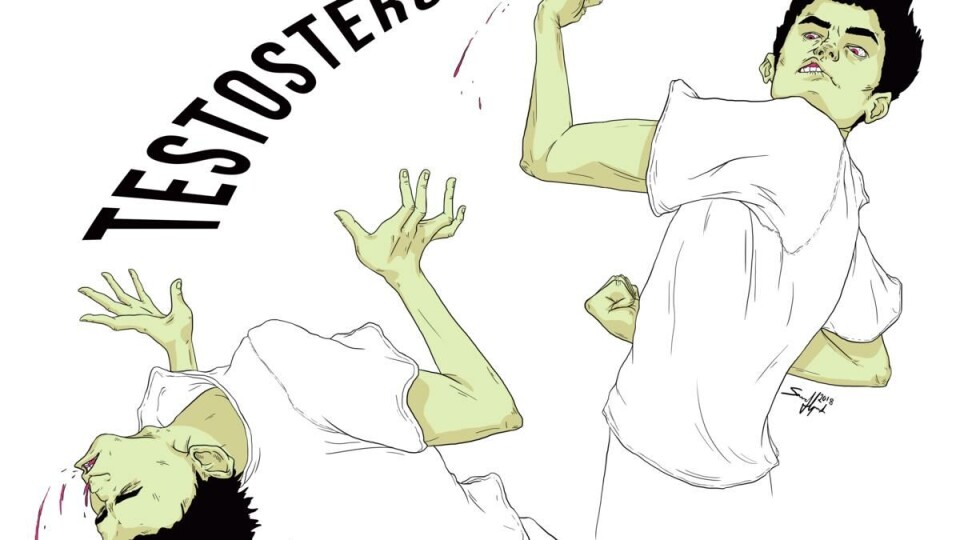
Are you feeling alright, guys?
Fights are breaking out at concerts, at Holmenkollen, and on the subway. What’s going on?
«What the fuck are you looking at?» the most aggressive of the guys snaps at us. They are young, but there are way more of them than us. He walks up to my friend, looking like he’s a second away from exploding. A reaction is all that this threatening gang is after, to have a reason to start something. Finally, a situation where the lessons from mindfulness provide a concrete benefit in my life, I think. We keep calm until the subway stops at Majorstuen. The leader of the gang spits at us on the way out, but only hits the glass over the seats. Every respectable member of the far-right Facebook-group «Fedrelandet viktigst» (Fatherland above all) would have their prejudices confirmed by the fact that these troublemakers had immigrant backgrounds.
A few days later I’m at a hip-hop concert. Big gangs of boys in the audience start multiple fights. Many of the spectators in this tight space fall to the ground, too. Who are these idiots? I think as I lay on the sticky floor with three sweaty bodies above me. Their clothing indicates that they’re from the west of Oslo, their faces indicate they’re just old enough to party. Large groups of guys with Uggs and a hairstyle like William’s from «Skam» are trying to figure out who’s the toughest in the rich part of Oslo. Of course, they’re swiftly thrown out and miss out on a concert that cost 300 NOK, but who cares?
With a blood alcohol content about as high as their GPA from last semester, they stagger back home toward Holmenkollen, only to do the same thing next weekend. Is it a coincidence that I encountered two such experiences in such a short timespan? Numbers from the Oslo police district show that criminality among youth in Oslo has increased dramatically in the last two years. From 2005 to 2015, the number of punishable offenses by those under 18 years old has halved. Then there was a sudden shift. From 2015 to 2017 the number increased by 45 percent.
In the time leading up to International Women’s Day, there was a focus on important social problems that impact women the most, such as sexual harassment. Can the reason for the rising level of criminality be social problems which, in a similar way, affect men? Numbers from the Central Bureau of Statistics (SSB) show that 95 percent of those in prison are men. Men have 20 times greater testosterone production than women and make up nearly all of those who possess hereditary personality traits that strongly correlate with criminal behavior. From a biological perspective we might be able to say men are more likely to be criminals. Nevertheless, the organisation of society is crucial in determining what happens to boys. I believe that there are two very important ways to prevent criminality. Good socialization and creating a sense of belonging to a community which facilitates accomplishment can do wonders for even the most aggressive people.
Boys do significantly worse than girls at high school and make up the majority of those who drop out. Furthermore, the male-dominated vocational programs have low status among youth. Currently, only 40 percent of those in higher education are men. According to research from psychiatry professor Dr. Dewey Cornell at the University of Virginia, 72 percent of American murderers from the 1990s had grown up without contact with their fathers. The same was true of 60 percent of rapists. Good male role models seem to be very important for the socialisation of boys as they grow up. It’s worrying, then, that around half of all Norwegian marriages end in divorce, and many boys grow up without contact with their father. Without good role models, academic success, or a feeling of belonging, the road towards destructive behavior is short. The next time I sit on the subway at Majorstuen, I’m mulling over my encounter here with the aggressive gang of teens. Situations like these can quickly result in the development of prejudices toward other groups of people. The key to avoiding this, I think, is the same that can solve the problems that many young boys experience; namely to empower the individual. Every individual ought to be treated as independent, along with the freedom and responsibility that comes with it, regardless of background. Even if one is unfairly treated by society or has a weak starting point, one has the choice to try and make the world a better place.
The reason I did not let myself be provoked by the gang at the subway does not have to do with me being born differently or the fact that I value an intact set of teeth. The choice was perhaps simple for me as a result of my upbringing and the structures that I have in my own life. Still, I believe that a choice like the one I made is one that everyone can and should be expected to take. I think individuals are able to start movements that can offer those around them possibilities and a feeling of being part of a community. This could either be through giving advice, organizing sports-related activities, or even something as simple as living in a positive way, so that those around them become inspired to do the same. Society has the responsibility to best facilitate strong family units, a solid option of extracurricular activities, and a school where everyone experiences accomplishment: if this is done, the future will be bright, and spitting on the subway may become history.































